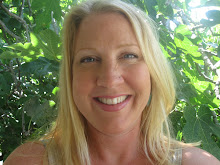"Julia taught me what it takes to find your way in the world. It's not what I thought it was. I thought it was all about-I don't know, confidence or will or luck. Those are all some good things to have, no question. But there's something else, something that these things grow out of. It's joy."
-Julie Powell, Julie and Julia: 365 Days, 524 Recipes, 1 Tiny Apartment Kitchen.
It is an ordinary scene, a young woman in her kitchen whipping up some sort of chocolate concoction to alleviate a particularly hideous day. She turns to her husband and explains she finds comfort in the fact, that after a day when nothing makes sense, she can follow a particular recipe and it will achieve a particular result. A harbor of reassurance in an ocean of uncertainty.
This young woman is Julie Powell, in Julie and Julia, a movie based on two books: one on Julie Powell's blog-turned-book in which she trudges through every single recipe in Mastering the Art of French Cooking, a sort of homage to her adoration of Julia Child as well as to her sometimes precious nature; and My Life in France, by Julia Child and Alex Prud'homme, which Julia describes as a book about some of the things she has loved most in her life: her husband, Paul Child; la belle France; and the many pleasures of cooking and eating.
The movie is a beautiful collage of the two books and personalities. Meryl Streep is a wonderfully credible Julia Child and the film provides an edited version of their time in France and after. While I do appreciate Julie Powell and her book, I have to say My Life in France is very simply a must-read for anyone interested in Julia and Paul Child.
The book is written as a series of stories, strung together chronologically, and are based upon countless letters saved by friends and family throughout the years. Julia writes that while her letters consisted of very badly spelled two to three page affairs documenting the latest escapades of their cat, any good gossip, and whatever food-related revelation she was currently enthusing over, Paul was a serious letter writer and would often include sketches and collages of news and photo clippings in addition to his journalistic detailing of their day-to-day life. It is in this way that My Life in France takes on an immediacy of detail, and at once you feel you yourself are there with Julia and Paul, enjoying "the brilliant sparkle of autumn light on the dark Seine," and "the smell of Montmartre at dusk."
Moving to France was a pivotal moment in Julia's life. It was where she found herself, awakened to the sensuality of food and life, came into her own, and found her calling.
This awakening is seen so vibrantly felt and described both on the pages of My Life in France and in Julie and Julia. Julia is a woman filled with joie de vivre. Her enthusiasm for everything about France is absolutely contagious, how she simply fell in love with its people, food, rituals, and its "generous pace of life." You see how really, although her life had evolved in a rather unplanned manner (Julia describes how, after attending Smith with only "half my burners on," she planned on becoming a famous novelist but instead found herself a bit afloat until she joined the service, began to travel, and met Paul), fate had a plan the whole time. That maybe the chaos of life is only chaos to the naked eye, but has a much richer and deeper cadence that is by nature unknowable.
Julia's transformation is such a joy largely because she is so honest about herself, so unselfconscious of any vanity. Upon her arrival in Paris, Julia says of herself, "I was a six-foot-two-inch, thirty-six-year-old, rather loud and unserious Californian." A year later she writes, "Upon reflection, I decided I had three main weaknesses: I was confused (evidenced by lack of facts, and inability to coordinate my thoughts, and an inability to verbalize my ideas); I had a lack of confidence, which caused me to come back down from forcefully stated positions; and I was overly emotional at the expense of careful, 'scientific' thought. I was thirty-seven years old and still discovering who I was."
But in discovering her calling, she discovered herself. She realized that while she could at times be "overly emotional," she "was lucky to have the kind of orderly mind that is good at categorizing things." This way of being was intrinsic to the success of her book and the launching of her career. Who else could have so passionately fallen in love with such a vast subject as French cookery or chronicled its many nuances as scientifically?
Julia Child's story is a quintessential tale destined to unfold. Perhaps that is why Julia writes "one of the things I loved about French cooking was the way that basic themes could be made in a seemingly infinite number of variations." That one could master a technique and really be set free creatively, allowing the technique to guide the form, and grant you, the season, and your mood, the artistic license.
Perhaps this is where the movie fell a bit short for me. It seemed to me that while Julie wanted the comfort and reassurrance of a recipe, Julia wanted the freedom of variation within the order of technique. Julia's way seems more joyful and free, and more mature. You get a sense that Julia had faith that on the other side of chaos lay order, that life could be very free if based on a foundation of structure, and that life could be trusted and lived with great, unassuming joie de vivre.












1 comment:
Wow. I think you nailed the little niggling doubt I had about this movie. Other than that I did enjoy it though.
Post a Comment